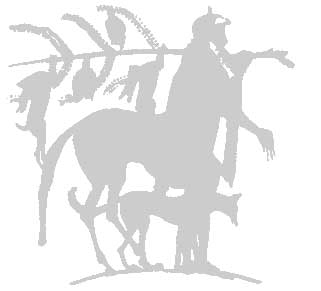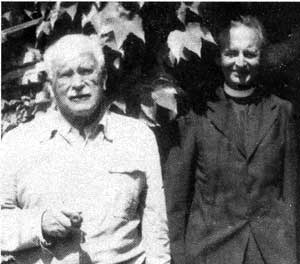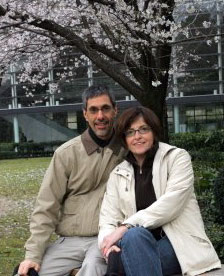ABOUT THE C.G. JUNG FOUNDATION
Newsletter of the C.G. Jung Foundation of Ontario
ISSN 1918-6142
Chiron is a newsletter that exists to support the work of the C.G. Jung Foundation of Ontario. It was established in 1980, and has existed in electronic form since 2006. Its name and masthead image, adopted at that time, are drawn from ancient Greek culture. In Greek mythology, Chiron was the last centaur, a son of the titan Cronus. He was famed for his wisdom, knowledge and skill at deciphering the will of the gods, to healing effect.
Volume 28, No. 3 Summer 2009
Editor: Robert Black
Contents
- The “PPMC” on your doorstep
- New complimentary membership offer
- Member ‘Meet and Greet’
- 40th Anniversary Party
- Jungian Views on Burning Issues
- A humorous offering
- Growth of the Global Jungian Community
- Discussion Group
- More on the Anniversary Party
- From your Editor
- Analysts Move
- Letters to the Editor
- Important New C.G. Jung Book
- Jung Lectures Published and now on Line
- Past issues
The “PPMC” on your doorstep: A promising look ahead
“What promise?” asked Oz.
“You promised to send me back to Kansas when the Wicked Witch was destroyed,” said the girl.
“You promised to give me brains,” said the Scarecrow.
“You promised to give me a heart,” said the Tin Woodman.
“You promised to give me courage,” said the Cowardly Lion.Frank L. Baum, The Wizard of Oz
It’s summertime, but as the dog days settle in, we both look ahead and look forward to September. The fall not only launches a new season of the C.G. Jung Foundation’s annual series of lectures and workshops, it also marks the beginning of a new attitude and energy for our public programme. The PPMC (our newly formed Public Programme Management Committee) has started work on expanding and invigorating our programme content as well as the relationship with members. We don’t promise you an Emerald City, but we do look ahead for more planned social functions and more Eros and engagement for our membership. We hope you will find some of the new initiatives encouraging. Here’s a look ahead.
NEW COMPLIMENTARY MEMBERSHIP OFFER!
Renew your membership — or become a new member — and you’ll receive another basic 2009-10 annual membership at no charge. We want to broaden our exposure and membership, so we’d like you to encourage others not previously known to us to attend our events. When you sign up or renew, we’ll send the person of your choice an annual membership absolutely free. Details will be mailed to you.

New
Member ‘Meet and Greet’ Orientation & Social Event mid-afternoon on Sunday, September 20, 2009. The precise time will be available on the website, or by calling the office closer to the time. Please help us introduce our new members to the book store, the library and the welcoming faces of our members, available analysts and the PPMC. A warm-up social at 223 St. Clair West with refreshments and for a closer look at the 2009-10 programme line up.
40th Anniversary Party!
Saturday evening, January 23, 2010. In January 1970, a lay Jungian organization called the Analytical Psychology Society of Ontario was established by the late Jim Shaw. Within a short time, it applied for and received legal existence as the C.G. Jung Foundation of Ontario. So in January 2010 we turn 40! It’s time to celebrate. Stay tuned to the website for details, but expect tantalizing door prizes, surprise guests, a memorable retrospective plus abundant fun and good cheer.
NEW!
Spring 2010. Jungian Views on Burning Issues. Come and participate in lively presentations and break-out discussion groups on hot contemporary topics. Three analysts will jump into the fray with short presentations reflecting their views on current issues. Participants will have a chance to express their reactions in small groups before reconvening for a summary round-up. Topics to be announced
These are some of the new ideas that we’re implementing, but there are more to come, we hope with your input. Stayed tuned for our mailing later this summer with the new Public Education Programme brochure—including your opportunity to get a free additional membership for a friend or family member when you renew or sign on.
PPMC
TP, RB, CD, RG.
A humorous offering
This list was generated by one of the analysts, “with a twinkle in his eye,” who prefers to remain anonymous – but in order to establish that it’s not your editor, let us just say that he resides far outside the GTA and has a well-known reputation as a humorist.
Emotional Phases of a Project
1. General Optimism
2. Disorientation Phase
3. General Confusion
4. Period of Uncontrolled Hesitation
5. Implacable Search for Culprits
6. Scramble to Save Your Neck
7. Exemplar Punishment of the Innocents
8. Recovery of the Lost Optimism
9. Inexplicable Completion of the Project
10. Commendments and Awards to Non-Participants
11. Search for New Projects Due to Experience Obtained
Growth of the Global Jungian Community
Ah, the numbers game. Not that they necessarily will mean much, but it’s interesting to look at available “Jungian numbers” as one sort of measurement to evaluate ourselves.
As of the end of 2008, there are just over 2,900 living Jungian Analysts in the world. Since an analyst’s practice might range anywhere from 0 to 45 analysands (the last is the highest number your editor has ever heard), the further topic of how many people might presently be in analysis is impossible to answer.
But as for people influenced by Jung’s ideas, well, the sky is not the limit any more – the numbers are surely “astronomical.” It is probably in the hundreds of millions who have in some way been influenced by Jung’s work, if even if it’s indirectly, or through such simple concepts as “introvert” and “extravert,” or through learning about themselves with one of the many valuable “type tests” grounded in his theories. Or more conservatively speaking, there are tens of millions who could say something articulate about his discoveries or approach.
This Foundation is one of a number of active groups seeking to increase this reach for the betterment of all. The real number of such groups is unknown. There’s no central body, for example, that tracks Jungian lay societies. Even locally, we don’t know the whole picture. Besides our own Foundation and the Jung Society at the University of Toronto, we hear of several such clusters scattered throughout our province alone.
To return to the solid ground of numbers and Analysts, at the end of May 2009 the International Association of Jungian Analysts (IAAP) issued its annual report with statistics as of December 31, 2008, reporting that there exist forty-nine voting societies of Jungian Analysts worldwide. There are in development a further twenty professional societies. These are in locations as diverse as Bulgaria, Chile, Colombia, Czech Republic, Ecuador, Estonia, Gauteng (South Africa), India (Ahmedabad and Bangalore), Hong Kong, Ireland, Poland (Krakow and Warsaw), Romania, Russia (separate groups in Moscow and St. Petersburg), Serbia, Shanghai, Slovenia, Tbilissi (Georgia), Tunisia, and Ukraine. There is a further cluster of preliminary discussions taking place in Malta, Taiwan and Kazakhstan.
In our own country, there are currently sixty-six living Jungian Analysts. The Ontario Association of Jungian Analysts (OAJA) is the largest professional group in the country; there are separate clusters based in British Columbia and Quebec. Most other Canadian analysts belong either to AGAP International, the Zürich-based society for graduates of the venerable Institute there, or to the Inter-Regional Society of Jungian Analysts, based mostly in the United States.
As for lay Jungians, it is hard to say. In our own Foundation, there are roughly eighty current (paid-up) members, and more “regulars” whom we welcome to workshops, seminars and lectures. There are about five hundred on our electronic (free) mailing list. All of it – everyone – helps to promote Jung’s work in this region.
Discussion Group

The “Jung and Spirituality” group has decided to discuss The Jung-White Letters, edited by Ann Conrad Lammers, during its new season next year. New members are welcome, and can contact Schuyler Brown at 416 241-5002 for further information. Meetings usually take place on the third Tuesday of the month at the Jung Foundation; the first meeting of the next year will take place on October 13.
More on the Anniversary Party
As you read on the first page, the fortieth anniversary of organized Jungian activity in this region is coming up in January 2010 – and in April 2011 comes the 50th anniversary of C.G. Jung’s death. This feels like a ready-made time celebrate with a year-long reflection on and awareness of our past, present and future as a distinct group of people.
The original Jungian society in this region was called the Analytical Psychology Society of Ontario (APSO). It was established by the late James Shaw, a businessman who had a long term Jungian analysis in New York City before moving to Canada. It was that group which morphed into a legal entity with charitable status, the present C.G. Jung Foundation of Ontario.
We are very keen not to omit anyone who might like to attend, especially founders and friends whose path may have diverged from ours since those days. If you know anyone in that category, would you please spread the news? Or let us have their contact information, so that we might get in touch with them.
From your Editor - The Value of the Collective
As wags often put it, “any discussion of a Jungian collective feels a bit like talking about a herd of cats.” We sometimes give the impression that we just don’t “do” community.
Must that always be so? According to the ancient traveler Pausanius, at Apollo’s temple in Delphi the motto ΓΝΩΘΙ ΣΕΑΥΤΟΝ (gnōthi seauton, “Know Thyself”) was inscribed right at the entrance, so as to be seen by all. It is the classical invitation to consciousness, and has been treated as such throughout Western literature – including by C.G. Jung himself. Such self-awareness requires, by definition, focus on oneself.
What value can there be to that process, then, of collectives? Well, for us, it seems to boil down to whether or not the collective under discussion supports self-awareness – individuation – or whether it works against it.
There is a generous contribution to this discussion on the value of collectives from C.G. Jung himself, one that has a direct connection to our own upcoming 40th anniversary as an organized Jungian group. In 1948, he wrote to support the formation of the same Analytical Psychology society in New York City whose member, Jim Shaw, twenty-some years after that, established the Analytical Psychology Society of Ontario:
Jung wrote,
“Although the dangers of the individual identifying with the collectivity are very great indeed, the relationship between these two factors is not necessarily negative. It has its very positive aspects as well. As a matter of fact a positive relationship between the individual and society or a group is essential, since no individual stands by himself but depends upon symbiosis with a group. The self, the very centre of an individual, is of a conglomerate nature. It is, as it were, a group. It is a collectivity in itself and therefore always, when it works most positively, creates a group.” (C.G. Jung, Letters, vol. I, page 508, italics added.)
Our positive relationship with the depths; our efforts for self-awareness; our devotion to the process of individuation; all these are expressed in the creation of a unique, if loose-fitting, community. Without deviating from our own work, why not put some energy into exploring the worth of our community as Jungians, and celebrate its existence?
Analysts Move
Two OAJA analysts, Paul Benedetto and Karen Kurtz, are moving to Guelph, Ontario. They will open their new offices located at 18 Colborn Street beginning August 24, 2009.

Karen and Paul met while studying at the C.G. Jung Institute – Zürich. They graduated after five years and have been in private practice in Toronto for the past six years. They will continue to offer individual analysis in Toronto at 717 Bloor St. W near the Christie subway.
People who know Guelph and have heard of Karen’s and Paul’s move comment either, “What a beautiful city” or, “Oh, Guelph is one of my favourite places.” Paul and Karen share these sentiments and are pleased by the warm welcome they are receiving in Guelph.
Paul and Karen look forward to getting to know the Jungian community in Guelph and the Golden Triangle. In addition to personal analysis Karen and Paul offer Sand Play therapy. They also plan to offer seminars on Jungian topics of interest. Their new offices are two blocks south of the University of Guelph near Stone Road and Gordon Street. Further information can be found on their website, which is listed in the Analyst section of the C.G. Jung Foundation site.
Letters to the Editor
(From Caroline Duetz) I want to tell you how impressed I was with the April Chiron. I read it all the way through and enjoyed all the articles and reports. The editorial gives people food for thought. I also liked very much the piece on nomenclature – an interesting reminder for us to be cautious about what we read (and who wrote it).
(From Daryl Sharp) Thank you. You bin doing good work.
(From Sherrie Shumavon) I love the quotes from C.G. Jung, and have been inspired by them to get out my volumes of his letters. I also knew nothing of the U of T New College courses for university students on things Jungian and see it as a creative way of introducing young adults to analytical psychology, not to mention the energy and creativity they might bring to OAJA's programmes. My best to you!

Important New C.G. Jung Book
A notice has been received from The Philemon Foundation that C. G. Jung’s magnum opus, the Red Book, will be published by W. W. Norton and Co on September 22, 2009. The Red Book is the third volume of the Philemon Series. Apparently, there is a significant discount if it is pre-ordered on Amazon.ca.
Jung Lectures Published and now on Line
The Texas A&M University Press has printed a number of Jungian lectures in its “Fay Lecture Series on Analytical Psychology” and has now made them available to the public on line at no cost. The following titles are available at this link.
1. Verena Kast on Joy
2. John Beebe on Integrity
3. Anthony Stevens on Two Million Year Self
4. Marion Woodman on Stillness
5. Kawai on Buddhism
6. Polly Eisendrath-Young on Gender
7. Murray Stein on Transformation
8. James Hollis on Imagination
9. Roberto Gambini on Soul and Culture
10. Stan Marlin on The Black Sun in Alchemy
11. Claire Douglas on The Old Woman's Daughter
12. Toyoda on Memories of Lost Hands
13. Luigi Zoja on Ethics and Analysis
14. Jan Wiener on Therapeutic Relationship
15. Joe Cambray on Synchronicity
Many thanks to Jungian analyst Paul Benedetto for bringing this fact to our attention.

Past issues available online
Back to top


